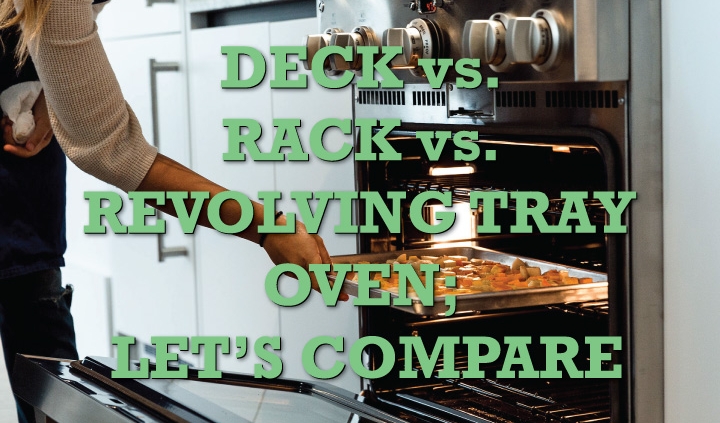Deck vs. Rack vs. Revolving Tray Oven; Let’s Compare
Whether you are a veteran baker, opening a new bakery, or just want to know the difference between them, it’s good to know which oven is best for your bakery. In this blog post, we will explain the difference between these ovens and the pros and cons of each oven.
Deck Ovens
Deck ovens use radiant heat and conduction to bake. A variety of baking surfaces are available from a ceramic, natural stone or a composite hearth. Deck ovens store energy (heat) in the hearth, this allows a constant steady heat throughout the baking cycle. Deck ovens are known for producing high quality bread products, as well as a very robust steam system. Deck ovens are used to produce high quality Artisan breads.
Pros:
Stored energy in the baking hearth
No moving air inside the deck
Highly effective steam system
Holds its temperature very well
Individual control for each deck (electric ovens)
Control of top and bottom element separately (electric ovens)
Cons:
Not as versatile as a convection oven
Very big and heavy
Large footprint
Requires more labor to operate
Slow temperature change
Rack Ovens
Rack ovens use convection heat, a form of air circulation where the heat is transferred by a fan to the baking products. The hot air produced by heating elements or a gas burner and the fan distribute the air throughout the baking chamber. The oven rack also rotates to ensure an even bake. Rack ovens are used to bake everything from breads to pastries and is a great all-purpose oven. These ovens utilize special carts or racks to support the baking pans. These racks can be used in the dough prep and proofing stages as well as the baking process. Thinking a bit more about purchasing a convection oven, read this convection buying guide blog post
Pros:
Very versatile (great for baking many things)
Evenly heats throughout the oven
Changes temperature quickly
Great range of baking
Faster baking times
Requires less labor
Steaming features are standard features
Small footprint
Cons:
May dehydrate delicate products
A rack oven is a “batch oven” meaning everything bakes at the same temp and time
Revolving Tray Ovens
Revolving Tray Ovens provide a “soft” bake because there is not moving air inside the baking chamber. The oven trays rotate through the heat zone to provide an even bake, which is why revolving tray ovens produce high quality cakes, soft rolls and buns like hamburger and hotdog buns and pan breads. Read more about revolving tray ovens here
Pros:
Soft, even bake
Does not dehydrate product
Cons:
Large foot print
Not energy efficient
The optional steam system is not very effective
What does this mean to me?
When evaluating your products, clientele, available space and budget, having the correct oven will help you reach your business goals. Understanding the advantages and limitations of each baking style will help you produce the best baked goods you can.
Choosing the right equipment is very important and that’s why Stratton Sales is always here for you. We can help you with concept and design of your bakery and see you through to the end by helping you maintain and service your equipment. Please give us a call anytime, we are always happy to answer any questions you may have.



